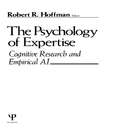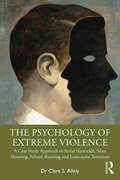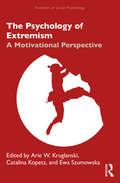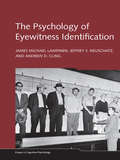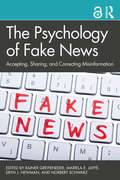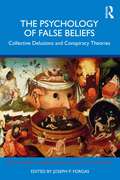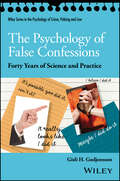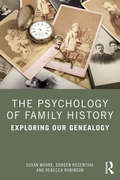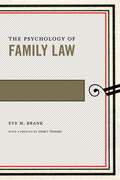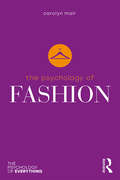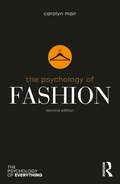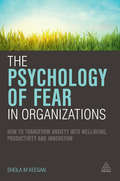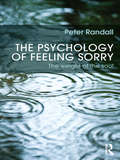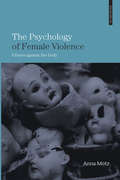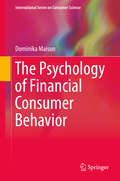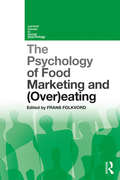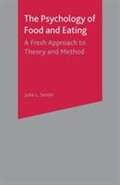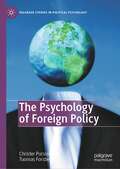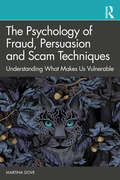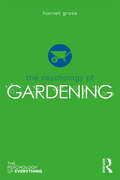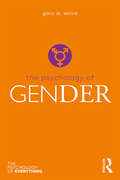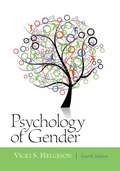- Table View
- List View
The Psychology of Expertise: Cognitive Research and Empirical Ai (Cambridge Handbooks In Psychology Ser.)
by Robert R. HoffmanThis volume investigates our ability to capture, and then apply, expertise. In recent years, expertise has come to be regarded as an increasingly valuable and surprisingly elusive resource. Experts, who were the sole active dispensers of certain kinds of knowledge in the days before AI, have themselves become the objects of empirical inquiry, in which their knowledge is elicited and studied -- by knowledge engineers, experimental psychologists, applied psychologists, or other experts -- involved in the development of expert systems. This book achieves a marriage between experimentalists, applied scientists, and theoreticians who deal with expertise. It envisions the benefits to society of an advanced technology for capturing and disseminating the knowledge and skills of the best corporate managers, the most seasoned pilots, and the most renowned medical diagnosticians. This book should be of interest to psychologists as well as to knowledge engineers who are "out in the trenches" developing expert systems, and anyone pondering the nature of expertise and the question of how it can be elicited and studied scientifically. The book's scope and the pivotal concepts that it elucidates and appraises, as well as the extensive categorized bibliographies it includes, make this volume a landmark in the field of expert systems and AI as well as the field of applied experimental psychology.
The Psychology of Extreme Violence: A Case Study Approach to Serial Homicide, Mass Shooting, School Shooting and Lone-actor Terrorism
by Clare S. AllelyFeaturing a unique overview of the different forms of extreme violence, this book considers the psychology of extreme violence alongside a variety of contributing factors, such as brain abnormalities in homicide offenders. Featuring several contemporary real-world case studies, this book offers insight into the psychology of serial homicide offenders, mass shooters, school shooters and lone-actor terrorists. The main purpose of this book is not to glorify or condemn the actions of these individuals, but to attempt to explain the motivations and circumstances that inspire such acts of extreme violence. By adopting a detailed case study approach, it aims to increase our understanding of the specific motivations and psychological factors underlying extreme violence. Using nontechnical language, this book is the ideal companion for students, researchers, and forensic practitioners interested in the multidisciplinary nature of extreme violence. This book will also be of interest to students taking courses on homicide, mass shooting, school shooting, terrorism, forensic psychology and criminology and criminal justice.
The Psychology of Extremism
by Katherine V. AumerThis volume examines the psychological factors, environments, and social factors contributing to identification with extremist identities and ideologies. Incorporating recent findings on interpersonal relationships, emotions, and social identity, the book aims to improve understanding of what makes individuals vulnerable to extremism. It concludes with a discussion of the intricacies of identification with extremist groups, a proposal for de-radicalization, and a call for awareness as a means to resist polarization. Chapters highlight interdisciplinary research into specific concepts and behaviors that can lead to extremism, addressing topics such as:● Homogamy, tribalism and the desire to belong● Shared hatred in strong group identities● The impact of emotional contagion on personal relationships● Dehumanization across political party linesAn in-depth exploration of an increasingly divisive modern issue, The Psychology of Extremism is an essential resource for researchers and students across social psychology, sociology, political psychology, and political science.
The Psychology of Extremism: A Motivational Perspective (Frontiers of Social Psychology)
by Arie W. Kruglanski Ewa Szumowska Catalina KopetzThis ground-breaking book introduces a new model of extremism that emphasizes motivational imbalance among individual needs, offering a unique multidisciplinary exploration of extreme behaviors relating to terrorism, dieting, sports, love, addictions, and money. In popular discourse, the term ‘extremism’ has come to mean largely ‘violent extremism’, but this is just one of many different types: extreme sports, extreme diets, political and religious extremisms, extreme self-interest, extreme attitudes, extreme devotion to a cause, addiction to substances, or behavioral addiction (to videogames, shopping, pornography, sex, and work). But do these descriptions have a deeper meaning? Do they reveal a common psychological dynamic? Or are they merely a mode of things about phenomena that have little in common? Bringing together world-leading psychologists from a variety of disciplines, the book uses a brand-new model to examine different expressions of extremism, at different levels of analysis (brain, hormones, and behavior), in order not merely to describe such behaviors but also to explain their occurrence, and the conditions under which they may be likely to emerge. Also including suggestions for ways in which extremism could be counteracted, and to what extent it appears to be harmful to individuals and society, this is essential reading for students and academics in psychology and behavioral sciences.
The Psychology of Eyewitness Identification (Essays in Cognitive Psychology)
by James Michael Lampinen Jeffrey S. Neuschatz Andrew D. ClingThis volume provides a tutorial review and evaluation of scientific research on the accuracy and reliability of eyewitness identification. The book starts with the perspective that there are a variety of conceptual and empirical problems with eyewitness identification as a form of forensic evidence, just as there are a variety of problems with other forms of forensic evidence. There is then an examination of the important results in the study of eyewitness memory and the implications of this research for psychological theory and for social and legal policy. The volume takes the perspective that research on eyewitness identification can be seen as the paradigmatic example of how psychological science can be successfully applied to real-world problems.
The Psychology of Facial Expression
by James A. Russell José Miguel Fernández-DolsThis reference work provides broad and up-to-date coverage of the major perspectives - ethological, neurobehavioral, developmental, dynamic systems, componential - on facial expression. It reviews Darwin's legacy in the theories of Izard and Tomkins and in Fridlund's recently proposed Behavioral Ecology theory. It explores continuing controversies on universality and innateness. It also updates the research guidelines of Ekman, Friesen and Ellsworth. This book anticipates emerging research questions: what is the role of culture in children's understanding of faces? In what precise ways do faces depend on the immediate context? What is the ecology of facial expression: when do different expressions occur and in what frequency? The Psychology of Facial Expressions is aimed at students, researchers and educators in psychology anthropology, and sociology who are interested in the emotive and communicative uses of facial expression.
The Psychology of Fake News: Accepting, Sharing, and Correcting Misinformation
by Rainer Greifeneder; Mariela E. Jaffé; Eryn J. Newman; Norbert SchwarzThis volume examines the phenomenon of fake news by bringing together leading experts from different fields within psychology and related areas, and explores what has become a prominent feature of public discourse since the first Brexit referendum and the 2016 US election campaign. Dealing with misinformation is important in many areas of daily life, including politics, the marketplace, health communication, journalism, education, and science. In a general climate where facts and misinformation blur, and are intentionally blurred, this book asks what determines whether people accept and share (mis)information, and what can be done to counter misinformation? All three of these aspects need to be understood in the context of online social networks, which have fundamentally changed the way information is produced, consumed, and transmitted. The contributions within this volume summarize the most up-to-date empirical findings, theories, and applications and discuss cutting-edge ideas and future directions of interventions to counter fake news. Also providing guidance on how to handle misinformation in an age of “alternative facts”, this is a fascinating and vital reading for students and academics in psychology, communication, and political science and for professionals including policy makers and journalists.
The Psychology of False Beliefs: Collective Delusions and Conspiracy Theories (Sydney Symposium of Social Psychology)
by Joseph P. ForgasThis exciting book outlines the fascinating social psychology of false beliefs and tribal delusions, examining the common human tendency to create and maintain collectively shared belief systems that have no foundation in reality. Bringing together leading international researchers, contributors explore how evolutionary, biological, cognitive, and social variables shape the creation and maintenance of widely shared but obviously false belief systems. The authors review how psychological processes promote the formation and maintenance of fallacious beliefs and discuss the philosophical and epistemological criteria we can use to classify some beliefs as false, and others as true.The chapters draw on many core areas of contemporary social life where false beliefs are of topical interest, highlighting the applied implications of this line of research. Topics include political polarisation, false narratives about group differences, pandemic conspiracy theories, fallacious theories in academia and the role of the media and the internet in creating distorted narratives.This book is engagingly written and will be of great interest to students and researchers in social psychology and the social sciences, as well as anyone seeking to understand one of the most intriguing issues that shape human social life.
The Psychology of False Confessions: Forty Years of Science and Practice (Wiley Series in Psychology of Crime, Policing and Law)
by Gisli H. GudjonssonProvides a comprehensive and up-to-date review of the development of the science behind the psychology of false confessions Four decades ago, little was known or understood about false confessions and the reasons behind them. So much has changed since then due in part to the diligent work done by Gisli H. Gudjonsson. This eye-opening book by the Icelandic/British clinical forensic psychologist, who in the mid 1970s had worked as detective in Reykjavik, offers a complete and current analysis of how the study of the psychology of false confessions came about, including the relevant theories and empirical/experimental evidence base. It also provides a reflective review of the gradual development of the science and how it can be applied to real life cases. Based on Gudjonsson’s personal account of the biggest murder investigations in Iceland’s history, as well as other landmark cases, The Psychology of False Confessions: Forty Years of Science and Practice takes readers inside the minds of those who sit on both sides of the interrogation table to examine why confessions to crimes occur even when the confessor is innocent. Presented in three parts, the book covers how the science of studying false confessions emerged and grew to become a regular field of practice. It then goes deep into the investigation of the mid-1970s assumed murders of two men in Iceland and the people held responsible for them. It finishes with an in-depth psychological analysis of the confessions of the six people convicted. Written by an expert extensively involved in the development of the science and its application to real life cases Covers the most sensational murder cases in Iceland’s history Deep analysis of the ‘Reykjavik Confessions’ adds crucial evidence to understanding how and why coerced-internalized false confessions occur, and their detrimental and lasting effects on memory The Psychology of False Confessions: Forty Years of Science and Practice is an important source book for students, academics, criminologists, and clinical, forensic, and social psychologists and psychiatrists.
The Psychology of Family History: Exploring Our Genealogy
by Doreen Rosenthal Susan Moore Rebecca RobinsonThis important book examines the motives that drive family historians and explores whether those who research their ancestral pedigrees have distinct personalities, demographics or family characteristics. It describes genealogists’ experiences as they chart their family trees including their insights, dilemmas and the fascinating, sometimes disturbing and often surprising, outcomes of their searches. Drawing on theory and research from psychology and other humanities disciplines, as well as from the authors’ extensive survey data collected from over 800 amateur genealogists, the authors present the experiences of family historians, including personal insights, relationship changes, mental health benefits and ethical dilemmas. The book emphasises the motivation behind this exploration, including the need to acknowledge and tell ancestral stories, the spiritual and health-related aspects of genealogical research, the addictiveness of the detective work, the lifelong learning opportunities and the passionate desire to find lost relatives. With its focus on the role of family history in shaping personal identity and contemporary culture, this is fascinating reading for anyone studying genealogy and family history, professional genealogists and those researching their own history.
The Psychology of Family Law (Psychology and the Law #4)
by Eve M. BrankWinner, 2021 Lawrence S. Wrightsman Book Award, given by the American Psychology-Law SocietyBridges family law and current psychological research to shape understanding of legal doctrine and policy Family law encompasses legislation related to domestic relationships—marriages, parenthood, civil unions, guardianship, and more. No other area of law touches so closely to home, or is changing at such a rapid pace—in fact, family law is so dynamic precisely because it is inextricably intertwined with psychological issues such as human behavior, attitudes, and social norms. However, although psychology and family law may seem a natural partnership, both fields have much to learn from each other. Our laws often fail to take into account our empirical knowledge of psychology, falling back instead on faulty assumptions about human behavior. This book encourages our use of psychological research and methods to inform understandings of family law. It considers issues including child custody, intimate partner violence, marriage and divorce, and child and elder maltreatment. For each topic discussed, Eve Brank presents a case, statute, or legal principle that highlights the psychological issues involved, illuminating how psychological research either supports or opposes the legal principles in question, and placing particular emphasis on the areas that are still in need of further research. The volume identifies areas where psychology practice and research already have been or could be useful in molding legal doctrine and policy, and by providing psychology researchers with new ideas for legally relevant research.
The Psychology of Fashion (The Psychology of Everything)
by Carolyn MairWhat do our clothes say about us? How do the clothes we wear affect our moods and emotions? How does the fashion industry encourage us to aspire to look in a certain way? The Psychology of Fashion offers an insightful introduction to the exciting and dynamic world of fashion in relation to human behaviour, from how clothing can affect our cognitive processes to the way retail environments manipulate consumer behaviour. The book explores how fashion design can impact healthy body image, how psychology can inform a more sustainable perspective on the production and disposal of clothing, and why we develop certain shopping behaviours. With fashion imagery ever present in the streets, press and media, The Psychology of Fashion shows how fashion and psychology can make a positive difference to our lives.
The Psychology of Fashion (The Psychology of Everything)
by Carolyn MairHow is fashion linked to our identity? How are we influenced to buy into fashion trends? How can we make the fashion industry more ethical and sustainable?The Psychology of Fashion offers an up-to-date insightful introduction to the exciting and dynamic world of fashion in relation to human behaviour. It explores consumer motivations, how fashion influences our thoughts and feelings, and why we develop certain shopping behaviours. It provides insights into how fashion design can impact healthy body image; how psychology can inform more sustainable views on the production, consumption, and disposal of clothing; and the potential for the industry to be a force for good. This thoroughly updated second edition includes new material on fashion and social media including TikTok and Instagram, a new chapter on the future of fashion which includes discussion of virtual and augmented reality in fashion, and an in-depth exploration of fashion sustainability. There is also a greater focus on equality and diversity in fashion, including fashion in different global cultures, fashion and gender, disability, and different body types.What we wear impacts us and those we interact with. Understanding the underlying psychological processes that influence our engagement with fashion empowers us to make informed decisions in relation to fashion consumption. The Psychology of Fashion shows how the application of psychology in the context of fashion can make a positive difference to our lives.
The Psychology of Fear in Organizations
by Sheila KeeganIn the context of global economic recession, fear has become institutionalized in many organizations, both in the private and public sectors. Board directors are under pressure from shareholders, senior executives are attempting to maintain sales in a nervous market and many people are concerned about job security and maintaining their living standards. This book shows how fear manifests itself in large organizations, how it impacts on the workforce and how by reducing our willingness to take risks and to innovate, it can inhibit economic growth and innovation, at both an individual and corporate level. The Psychology of Fear in Organizations examines the psychological barriers to innovation and presents initiatives to loosen the paralysis caused by the economic downturn.
The Psychology of Fear in Organizations: How to Transform Anxiety into Well-being, Productivity and Innovation
by Sheila KeeganIn the context of global economic recession, fear has become institutionalized in many organizations, both in the private and public sectors. Board directors are under pressure from shareholders, senior executives are attempting to maintain sales in a nervous market and many people are concerned about job security and maintaining their living standards. The Psychology of Fear in Organizations shows how fear manifests itself in large organizations, how it impacts on the workforce and how by reducing our willingness to take risks and to innovate, it can inhibit economic growth and innovation, at both an individual and corporate level. The Psychology of Fear in Organizations examines the psychological barriers to innovation and presents initiatives to loosen the paralysis caused by the economic downturn. It presents psychological theory in an accessible way to provide a better understanding of the needs and fears of people and how they can be supported to improve productivity and innovation. Online supporting resources include lecture slides on how to harness fear to fuel innovation.
The Psychology of Feeling Sorry: The Weight of the Soul
by Peter RandallCan feeling genuinely sorry enable an important healing experience? Can relieving the weight of guilt restore a general sense of self-worth? Can an individual's dawning awareness give birth to feelings of remorse; perhaps even to acts of repentance? The concepts of betrayal, vengeance and forgiveness have long been a major part of religious doctrine throughout the world. However, only in recent times has the impact of these emotions become of interest to those involved in psychological study. In The Psychology of Feeling Sorry, Peter Randall links contemporary psychological research with religious teachings and doctrine that have provided spiritual guidance for hundreds of years. Illustrated with explanatory narratives, Randall fuses religious precepts with psychological theory concerning one of the least understood but most common of human emotions; feeling bad about one's 'sins'. Using an eclectic approach Randall explores how much of what is believed within the domain of faith is now supported by modern psychological research. This book will be of interest not only to those with religious beliefs, but to psychologists, psychotherapists, students, and anyone with an interest in the intersection of psychology, psychotherapy, and theology.
The Psychology of Female Violence: Crimes Against the Body
by Anna MotzFirst Published in 2000. Routledge is an imprint of Taylor & Francis, an informa company.
The Psychology of Financial Consumer Behavior (International Series on Consumer Science)
by Dominika MaisonThis book stresses the psychological perspective in explaining financial behavior. Traditionally, financial behaviors such as saving, spending, and investing have been explained using demographic and economic factors such as income and product pricing. The consequence of this way of thinking is that financial institutions view their clients mostly from the perspective of their income. By taking a psychological approach, this book stresses the perspective of consumers confronted with a quickly changing financial world: the changing of financial offers and products (savings, investments, loans), the changing of payment methods (from cash to cheques, cards and mobile payments), the accessibility and temptation of goods, and the changing of insurance and pension systems.The Psychology of Financial Consumer Behavior provides insight into the thought processes of consumers in a variety of financial topics. Coverage includes perceptions of wealth, the pleasure or pain of spending, cashless transactions, saving and investing, loans, planning for the future, taxes, and financial education. The book holds appeal for researchers, professionals, and students in economics, psychology, economic psychology, marketing and consumer science, or anyone interested in financial behaviors.
The Psychology of Food Marketing and Overeating
Integrating recent research and existing knowledge on food marketing and its effects on the eating behaviour of children, adolescents, and adults, this timely collection explores how food promotion techniques can be used to promote healthier foods. Numerous factors influence what, when, and how we eat, but one of the main drivers behind the unhealthy dietary intake of people is food marketing. Bringing together important trends from different areas of study, with state-of-the-art insights from multiple disciplines, the book examines the important factors and psychological processes that explain the effects of food marketing in a range of contexts, including social media platforms. The book also provides guidelines for future research by critically examining interventions and their effectiveness in reducing the impact of food marketing on dietary intake, in order to help develop new research programs, legislation, and techniques about what can be done about unhealthy food marketing. With research conducted by leading scholars from across the world, this is essential reading for students and academics in psychology and related areas, as well as professionals interested in food marketing and healthy eating.
The Psychology of Food and Eating: A Fresh Approach to Theory and Method
by John L. SmithThere has long been an interest in food among psychologists across the full range of the discipline, from the physiology of hunger and the psychophysics of taste and smell to the development of food preferences and the social psychology of food-related behaviour and attitudes. In this new text, John L. Smith takes a much-needed broad view of the field, bringing together physiological research, psychodynamic theory, and sociological perspectives in a way that both celebrates their differences and explores their potential fusion. The Psychology of Food and Eating provides more than a 'dry' decontextualised physiological explanation of food and eating. It moves on to enable students to see food in its wider context in terms of everyday life and real routines. It provides an overview of social scientific approaches to the study of food (biosocial, socioanthropological, structural, feminist/psychodynamic) and an appreciation of the various ways that social psychological perspectives can be applied to real-life contexts. With its detailed (and almost confessional) account of the research process, students will gain an insider's perspective on how observational and idiographic techniques are deployed in practice in everyday settings. The book will prove of interest not only to students and researchers on health psychology, applied psychology and critical psychology courses, but also to all those looking for a really accessible introduction to contemporary alternatives to the more conventional research techniques used in this field.
The Psychology of Foreign Policy (Palgrave Studies in Political Psychology)
by Christer Pursiainen Tuomas ForsbergThis book focuses on foreign policy decision-making from the viewpoint of psychology. Psychology is always present in human decision-making, constituted by its structural determinants but also playing its own agency-level constitutive and causal roles, and therefore it should be taken into account in any analysis of foreign policy decisions. The book analyses a wide variety of prominent psychological approaches, such as bounded rationality, prospect theory, belief systems, cognitive biases, emotions, personality theories and trust to the study of foreign policy, identifying their achievements and added value as well as their limitations from a comparative perspective. Understanding how leaders in world politics act requires us to consider recent advances in neuroscience, psychology and behavioral economics. As a whole, the book aims at better integrating various psychological theories into the study of international relations and foreign policy analysis, as partial explanations themselves but also as facets of more comprehensive theories. It also discusses practical lessons that the psychological approaches offer since ignoring psychology can be costly: decision-makers need to be able reflect on their own decision-making process as well as the perspectives of the others. Paying attention to the psychological factors in international relations is necessary for better understanding the microfoundations upon which such agency is based.
The Psychology of Fraud, Persuasion and Scam Techniques: Understanding What Makes Us Vulnerable
by Martina DoveThe Psychology of Fraud, Persuasion and Scam Techniques provides an in-depth explanation of not only why we fall for scams and how fraudsters use technology and other techniques to manipulate others, but also why fraud prevention advice is not always effective. Starting with how fraud victimisation is perceived by society and why fraud is underreported, the book explores the different types of fraud and the human and demographic factors that make us vulnerable. It explains how fraud has become increasingly sophisticated and how fraudsters use communication, deception and theories of rationality, cognition and judgmental heuristics, as well as specific persuasion and scam techniques, to encourage compliance. Covering frauds including romance scams and phishing attacks such as advance fee frauds and so-called miracle cures, the book explores ways we can learn to spot scams and persuasive communication, with checklists and advice for reflection and protection. Featuring a set of practical guidelines to reduce fraud vulnerability, advice on how to effectively report fraud and educative case studies and examples, this easy-to-read, instructive book is essential reading for fraud prevention specialists, fraud victims and academics and students interested in the psychology of fraud.
The Psychology of Gardening (The Psychology of Everything)
by Harriet GrossWhy do so many people love gardening? What does your garden say about you? What is guerrilla gardening? The Psychology of Gardening delves into the huge benefits that gardening can have on our health and emotional well-being, and how this could impact on the entire public health of a country. It also explores what our gardens can tell us about our personalities, how we can link gardening to mindfulness and restoration, and what motivates someone to become a professional gardener. With gardening being an ever popular pastime, The Psychology of Gardening provides a fascinating insight into our relationships with our gardens.
The Psychology of Gender (The Psychology of Everything)
by Gary WoodWhat is the difference between sex and gender? What is the impact of gender-role stereotypes on our lives, our relationships and the world? What does gender mean to you? The Psychology of Gender looks at our biology, history and culture to consider the impact of gender roles and stereotypes, and addresses the 'dilemmas' we have regarding gender in a post-modern world. It offers a unique perspective on gender through storytelling and explores ideas around transgender and cisgender identities and androgyny, tackling hidden assumptions and helping us make sense of the world of gender. By examining the future of gender, The Psychology of Gender offers a platform for further exploration, and arrives at a new psychology of gender that emphasises relationships and helps us to understand our own gender identity and that of those around us.
The Psychology of Gender: Fourth Edition
by Vicki S. HelgesonUnlike other gender texts, Psychology of Gender focuses equally on both men and women, drawing from empirical research and conceptual discussions.The book includes research and discussions surrounding gender in the areas of psychology, sociology, anthropology, medicine, and public health. It reviews the research from multiple perspectives, but emphasizes the implications of social roles, status, and gender-related traits, particularly for relationships and health–areas that are central to students' lives and that have a great impact on their day-to-day functioning. The text is designed for upper-level undergraduate/graduate-level gender-focused courses in a variety of departments.
